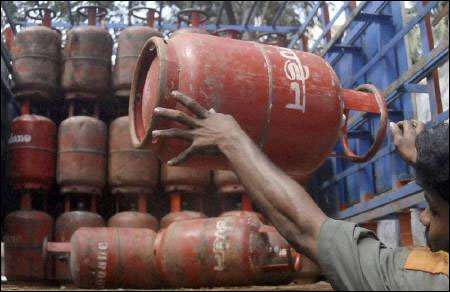 | « Back to article | Print this article |

Sales of subsidised LPG cylinders under the Direct Benefit Transfer scheme have come down by about 25 per cent as most ‘ghost beneficiaries’ have been eliminated, Chief Economic Advisor Arvind Subramanian said on Thursday.
". . . essentially, what we find is that on an average, the DBT scheme has reduced subsidised domestic LPG sales by about 25 per cent," Subramanian said while speaking at the United Nations Development Programme conference call in New Delhi.
On the fiscal impact of DBT, the CEA said, "We estimate that in 2014-15, savings could be as much Rs 12,700 crore (Rs 127 billion), which is a lot of money. But savings will be lower this year at around Rs 6,500 crore (Rs 65 billion)."
Subramanian, however, cautioned that the government should make sure genuine beneficiaries are not excluded.
"It's necessary that we don't overestimate the gain and under-recognise possible cost of doing this and in the case of DBT and Pahal, we have some preliminary evidence to suggest that a lot of it is elimination of ghost beneficiaries, but we can't rule out that there could be exclusion of genuine beneficiaries," he said.
Subramanian, formerly a senior Fellow at Peterson Institute for International Economics, admitted: "We were expecting commercial sales to go up by a huge number, but actually, this did not happen... there was only 6 per cent increase."
Under Pahal, earlier known as DBT, LPG cylinders are sold at market rates and consumers get the subsidy directly in their bank accounts.
This is done either through an Aadhaar or a bank account linkage.
Pahal looks to cut down diversion and eliminate duplicate or bogus LPG connections.
The CEA added that because of schemes like Pahal, Jan Dhan and Aadhaar, institutional arrangement has improved and ‘things are now working’.
On the crisis engulfing Greece, Subramanian said, "The (Indian) markets have come back."
Subramanian said DBT could have been even more valuable ‘had our tax system been a little bit more rational’.
"The price gap between commercial sales and non-subsidised domestic sales of LPG is 32 per cent.
“A big chunk of it is taxes.
“The Centre imposes 5 per cent Customs and 8 per cent excise duty, and states on an average impose 13 per cent tax on commercial LPG," he said.
Maintaining that it's ‘very fashionable’ in India to speak about 2nd, 3rd, 4th generation of reforms, the CEA said, "In fact, I would say we have not even done first generation reforms."
Cautioning against extending the DBT scheme, he said, "In the case of kerosene, a user is less literate and lives in remote areas. The last-mile connectivity problems become much more problematic."
On rationalisation of food and fertiliser subsidy, Subramanian said, "I think different parts of the government, both individually and collectively, are coming out with ideas."
Image: An employee from a gas agency loads a cooking gas cylinder onto a truck in Chennai. Photograph: Babu/Reuters